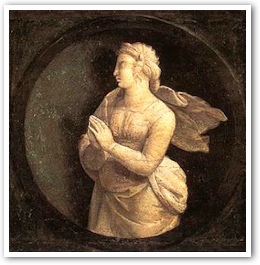More Reflections on the Incarnation
- FR. KENNETH BAKER, S.J.
It is a dogma of Catholic faith that God became man in Jesus. We profess our belief in this article every time we pray the Creed.
 |
The more we reflect on this amazing truth, the more we should be astonished at the miracle of God's love for man.
Let us consider what the Incarnation means for us personally. First, it means that God became what we are. And what are we? We are weak, inconstant creatures, tied down by the limitations of time and space. We feel the tug of the earth and a powerful attraction for God. And who is God? God is the fullness of all being and perfection, eternal, all-powerful, all-good and loving. He is also our Creator, our first beginning and our last end.
Given that we are so needy and that God is the infinite source of everything that is, the incomprehensible element in the Incarnation is that God would deign to empty himself, to deprive himself as it were, in order to become man. St. Paul says of Jesus that "though he was in the form of God, he did not count equality with God a thing to be grasped, but emptied himself, taking the form of a servant, being born in the likeness of men" (Phil 2:6-7). So God became like us in all things except sin.
Various Christian thinkers in the past have strayed from the truth in their attempts to explain this sublime mystery of the Enfleshment of God, because they could not fundamentally accept the reality that God became man. Some said that Jesus was a holy man who was "adopted" by God and elevated to the level of the divine. Others said that Jesus, though God himself, only appeared to be man but was not actually made of flesh and blood as we are. Others said that the Word of God, who is the Person of Christ, is not himself God but only the first and most noble creature of God. There are more variations on the same theme. They all come down to denying that Jesus Christ is true God and true man, consubstantial with God in his divinity and consubstantial with us in his humanity.
If any of these christological theories were true, then it would follow that God did not really become man, that the Son of God did not unite to himself hypostatically our human nature, that the sacraments are useless and the Church is a fraud. If the above views were true, then those tremendous words "and the Word was made flesh and dwelt among us" in John 1:14 would be false. In short, the entire kergma of the Church, that is, the preaching about the life, miracles, death and Resurrection of Jesus, would be a lie. Hence, the Church in the fourth and fifth centuries reacted very strongly to these ideas, completely rejected them and branded them for all times as "heretical".
On the positive side, the Incarnation means that by becoming man God has taken to himself the reality of the material world. In Jesus Christ we know that God loves us. His love for us is so great that he "emptied" himself, in the words of St. Paul, in order to become one of us. He did this not for himself, but "for us men and for our salvation".
The message of salvation in Jesus is almost too great and too good to be true. But we know it is true because of the life and death of Jesus, who was the first Witness, the first Martyr. The Apostles gave witness to this truth with their blood. The same can be said for countless thousands of saints and martyrs.
Because of the Incarnation Christianity is a religion of hope and not of despair. God came so very close to us in Jesus of Nazareth. In him God demonstrated his love for us and is now calling to us for our response of love.
See the index of chapters from Fundamentals of Catholicism which have been reprinted to CERC here.
 This is Meaghen Gonzalez, Editor of CERC. I hope you appreciated this piece. We curate these articles especially for believers like you.
This is Meaghen Gonzalez, Editor of CERC. I hope you appreciated this piece. We curate these articles especially for believers like you.
Please show your appreciation by making a $3 donation. CERC is entirely reader supported.

Acknowledgement
Kenneth Baker, S.J. "More Reflections on the Incarnation." In Fundamentals of Catholicism Vol. 1 Chapter 19 (San Francisco: Ignatius Press, 1995), 62-63.
This article reprinted with permission from Father Kenneth Baker, S.J.
The Author

 Father Kenneth Baker, S.J., assumed editorship of Homiletic & Pastoral Review in April 1971 and remained in this position for almost forty years. In 1983 he published a three-volume explanation of the faith called Fundamentals of Catholicism Vol. 1, Creed and Commandments; Vol. 2, God, Trinity, Creation, Christ, Mary; and Vol. 3, Grace, the Church, the Sacraments, Eschatology
Father Kenneth Baker, S.J., assumed editorship of Homiletic & Pastoral Review in April 1971 and remained in this position for almost forty years. In 1983 he published a three-volume explanation of the faith called Fundamentals of Catholicism Vol. 1, Creed and Commandments; Vol. 2, God, Trinity, Creation, Christ, Mary; and Vol. 3, Grace, the Church, the Sacraments, Eschatology




